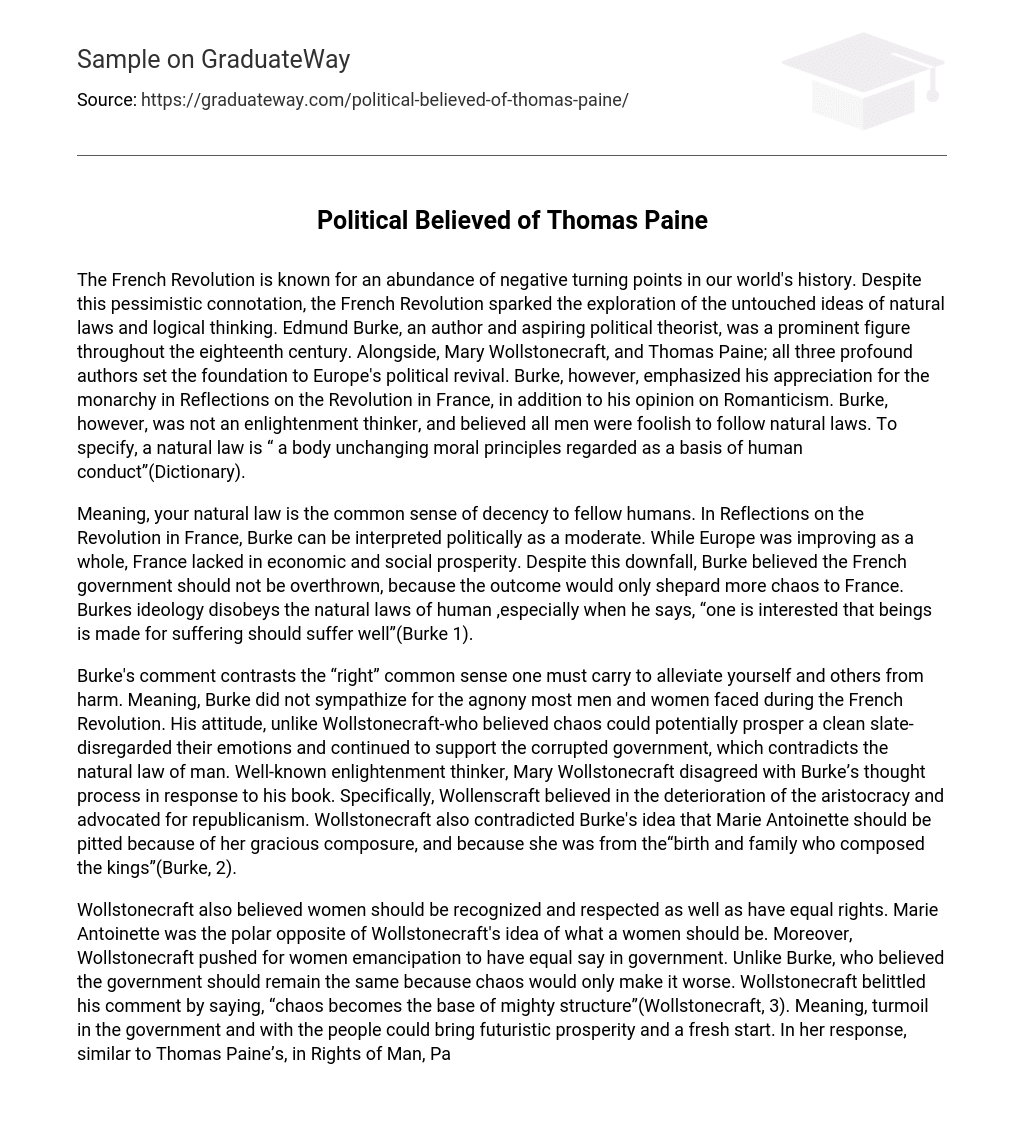The French Revolution is known for an abundance of negative turning points in our world’s history. Despite this pessimistic connotation, the French Revolution sparked the exploration of the untouched ideas of natural laws and logical thinking. Edmund Burke, an author and aspiring political theorist, was a prominent figure throughout the eighteenth century. Alongside, Mary Wollstonecraft, and Thomas Paine; all three profound authors set the foundation to Europe’s political revival. Burke, however, emphasized his appreciation for the monarchy in Reflections on the Revolution in France, in addition to his opinion on Romanticism. Burke, however, was not an enlightenment thinker, and believed all men were foolish to follow natural laws. To specify, a natural law is “ a body unchanging moral principles regarded as a basis of human conduct”(Dictionary).
Meaning, your natural law is the common sense of decency to fellow humans. In Reflections on the Revolution in France, Burke can be interpreted politically as a moderate. While Europe was improving as a whole, France lacked in economic and social prosperity. Despite this downfall, Burke believed the French government should not be overthrown, because the outcome would only shepard more chaos to France. Burkes ideology disobeys the natural laws of human ,especially when he says, “one is interested that beings is made for suffering should suffer well”(Burke 1).
Burke’s comment contrasts the “right” common sense one must carry to alleviate yourself and others from harm. Meaning, Burke did not sympathize for the agnony most men and women faced during the French Revolution. His attitude, unlike Wollstonecraft-who believed chaos could potentially prosper a clean slate-disregarded their emotions and continued to support the corrupted government, which contradicts the natural law of man. Well-known enlightenment thinker, Mary Wollstonecraft disagreed with Burke’s thought process in response to his book. Specifically, Wollenscraft believed in the deterioration of the aristocracy and advocated for republicanism. Wollstonecraft also contradicted Burke’s idea that Marie Antoinette should be pitted because of her gracious composure, and because she was from the“birth and family who composed the kings”(Burke, 2).
Wollstonecraft also believed women should be recognized and respected as well as have equal rights. Marie Antoinette was the polar opposite of Wollstonecraft’s idea of what a women should be. Moreover, Wollstonecraft pushed for women emancipation to have equal say in government. Unlike Burke, who believed the government should remain the same because chaos would only make it worse. Wollstonecraft belittled his comment by saying, “chaos becomes the base of mighty structure”(Wollstonecraft, 3). Meaning, turmoil in the government and with the people could bring futuristic prosperity and a fresh start. In her response, similar to Thomas Paine’s, in Rights of Man, Paine believes in the separation of the thirteen colonies and the Church of England. In retrospect, the emancipation did bring calamitous turmoil, however, in the end, the new colonies prospered. This is similar to Wollstonecraft’s beliefs because she declares with or without chaos separation must be endured to become a better nation. Adding on, Thomas Paine first mentions his political view point in his book, Common Sense.
Similar to Rights of Man, Paine argues the effect of indepence and the commencement of the democratic republic in Europe, as well as the New World. Even though Rights of Man is a more elaborate text on Paine’s thought process, Common Sense incorporates his arguments in which people from any intellectual background can understand. Since the eighteenth century, Europe’s ideology on political structure has changed emmancily. Paine and Wollstonecraft set the standard for political emancipation and became the advocators for not only women’s rights, but for fair government. In particular, France benefited from the French Revolution, because of the excommunication of King Louis XVI and Marie Antoinette. Burke, however was wrong in the sense of political structure, his narrow minded ideas not only were false, but also would have harmed the people of France.





